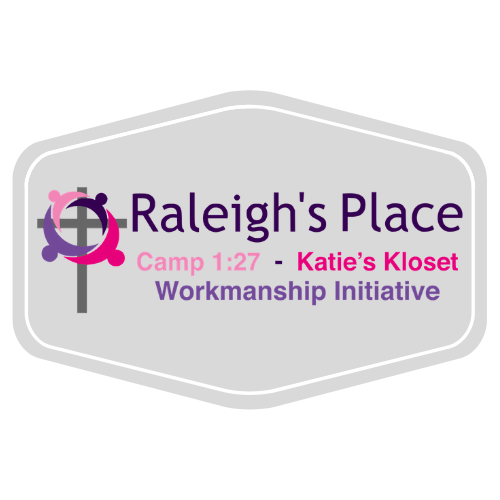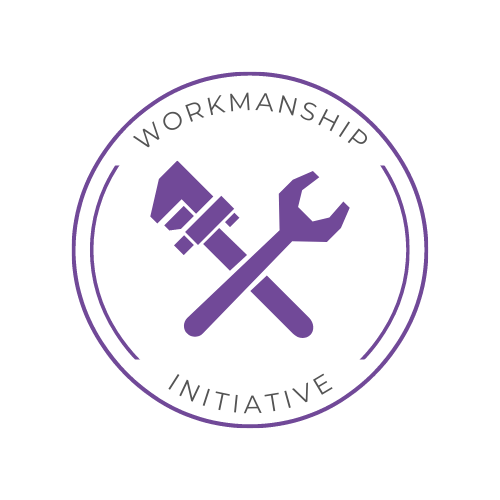For we are his workmanship, created in Christ Jesus for good works, which God prepared beforehand, that we should walk in them.
Ephesians 2:10
The Workmanship Initiative is a program of Raleigh’s Place that specifically targets foster children who are aging out of care or who have already transitioned into early adulthood. The odds of success for these young men and women are extremely low. A quick glance at some important statistics show a glowing disparity between children aging out of care and “average” children their age who do not share a similar life experience. According to the National Conference of State Legislatures, Youth Aging Out of Care at 18, by the Numbers:
- 1-in-5 was homeless; 36 percent of youth had been homeless at least once by age 26; nearly half of those youth had been homeless more than once and nearly 75 percent had been homeless four or more times.
- Only 58 percent graduated high school by 19 (compared with 87 percent of all 19-year olds). One-fifth of 26-year-old’s did not have a high school diploma or GED; only 8 percent of these young adults had earned a postsecondary degree.
- Only 46 percent of youth in the same study were employed. $13,989 was the average income earned at age 26 and 26 (compared to $32,312 for youth in the general population.
- 1 in 4 was involved in the criminal justice system within 2 years of leaving care.
- 30 percent of 21-year-old former foster youth reported criminal justice system involvement.
- By age 26, the majority of young women and four-fifths of young men in the study had been arrested; nearly one-third of those young women and almost two-thirds of the young men had spent at least one night in jail since they were 18 years old.
- Nearly 80 percent of young women became pregnant by age 26 (compared with 55 percent of young women in the general population).
In Alabama alone, the numbers are not much better. By age 21, 18% of Alabama’s emancipated youth have experienced homelessness; 58% have completed a high school diploma or GED; 55% are currently working part-time or full-time jobs; 29% have been incarcerated; and 26% of young women have given birth to a child. These children lack the stability, guidance, and training necessary to become successful adults. They age out of care, are given a check, and essentially told, “Good luck!” Our desire is to step in and fill an obvious void that these children have in their lives.
The Workmanship Initiative exists to tear down barriers that prevent foster youth from thriving as adults by providing housing and developing skills to attain self-sufficiency. We want to prevent homelessness, educate foster youth, help prepare them for the workforce, keep them out of the criminal justice system and off the street, and teach them risk management as to avoid substance abuse and early pregnancy. We will do this by focusing on four primary areas: Education, Life Skills Training, Job Training, and Job Placement.
Education
Roughly half of emancipated youth have completed their high school diploma or GED. In today’s society, that makes for an immediate uphill battle when it comes to having a successful career. Nearly every entry level job requires a high school diploma or GED. Our first step in the program is to help our participants earn their GED if they do not have a high school diploma. We will provide tutors who will help participants learn and understand what they need to know to successfully complete a GED.
For those who complete the GED or already possess a high school diploma and have a desire to pursue further education, we will work with them to make that dream a reality. Our participants will be encouraged to pursue jobs and education that will make them a highly desirable employee. Clanton is home to both LeCroy Career and Technical Center and Jefferson State Community College. LeCroy offers several trade programs that when successfully completed result in certification in the appropriate field. Their program offerings include: auto body repair, HVAC, welding, and health sciences. Jeff State offers a number of 2 & 4 year degree options including: nursing, manufacturing technology, computer information systems, and other health science programs.
If “knowledge is power,” then we want our participants to have the most knowledge they can receive to be prepared for the work place.
Life Skills
Concurrently with education, we also want to teach our participants key life skills. We want our participants to finish our program with skills that include: personal hygiene, cooking, personal finance and budgeting, tax prep, household management, and good driving practices. We want our participants to know how to care for themselves so they can live healthy and productive lives. A large focus will be on these practical matters.
Job Training
Our participants will also receive job training. This aspect of the program will focus on helping participants understand what it means to be a good employee and also helping them figure out which career best suits them individually. As we work with our participants to be good employees, we want them to understand how to build a resume, interview, and accept a job; give a proper handshake; make good eye contact when speaking; keep a neat workspace; work with a team; practice appropriate workplace dress and hygiene; time management; and other practical workplace skills.
Our participants will also go through career counseling so they can understand which careers best fit their personality, passions, and desires. During this time they will be directed to pursue education to help prepare for their career. They will also have an opportunity to take on an internship or job shadowing in the career field they are interested with one of our partner businesses or companies. We want our participants to have a clear understanding of what their anticipated career path looks like. We want to help set healthy expectations and build excitement about being an adult.
Job Placement
The last phase of the program is to successfully place a participant into a career. After receiving a proper education, life and job skills, our participants should be ready to begin their careers. We will work to place our participants in a career that best matches their education, skills, abilities, and interest. We want to help them find a career that gives them great excitement and hope for their future.
Our work is not done once participants are placed into a job. We are committed to our participants. By the time they finish our program they will be like family. We will have a personal relationship with each participant and desire to keep contact. All participants are always invited to Raleigh’s Place events and functions. There is always an open seat at our table during Thanksgiving and other holidays. Our hope is to see their lives transformed by taking ownership of the course that has been laid out before them. Like a good craftsman, we want to see our participants take their life in their own hands and begin to work it into something that makes them proud.
Much of this training will come in a blended classroom setting. We have adapted a curriculum called Project Life to meet our needs in equipping these young men and women with the skills and knowledge they need. Included in the curriculum are several assessments to gauge where our participants are and where they need to go to meet their goals. These assessments include life skills, career plans and dreams, personality, and talent assessments among others. The curriculum itself includes topics such as career preparation, the importance of education and how to access it, housing management, health and nutrition, risk prevention, and financial management.
This curriculum can be administered in different ways. The topics and assessments are in perfect alignment with the Department of Human Resource’s Independent Living Program. We can provide an instructor for those DHRs surrounding us that do not have a strong ILP in place. Currently we are offering this service to Chilton County’s DHR twice a month meeting every 2nd and 4th Tuesday evening.
Once we complete our transitional living apartments these elements will be much more hands on. We will work with residents one on one to make sure they meet their educational and career goals. Their training will be much more intense as we daily seek to grow in the knowledge and skill necessary to succeed as adults. Our resident program will also focus more on job training as they seek to find career paths that match their talents, gifts, passions, desires, and education. We will do this by creating apprenticeships or internships with local companies.

